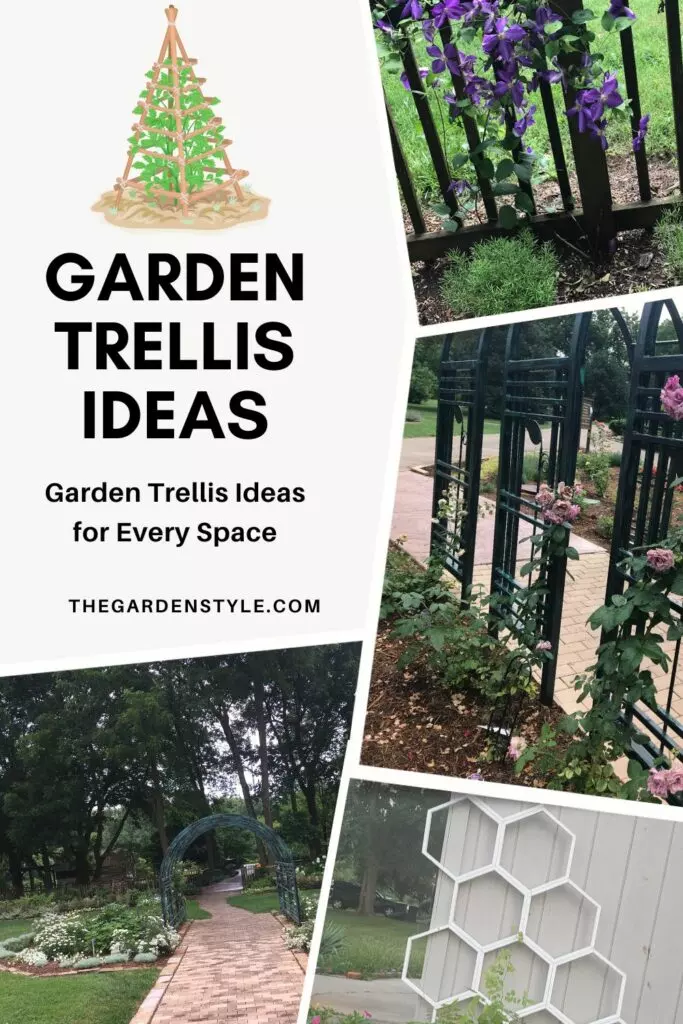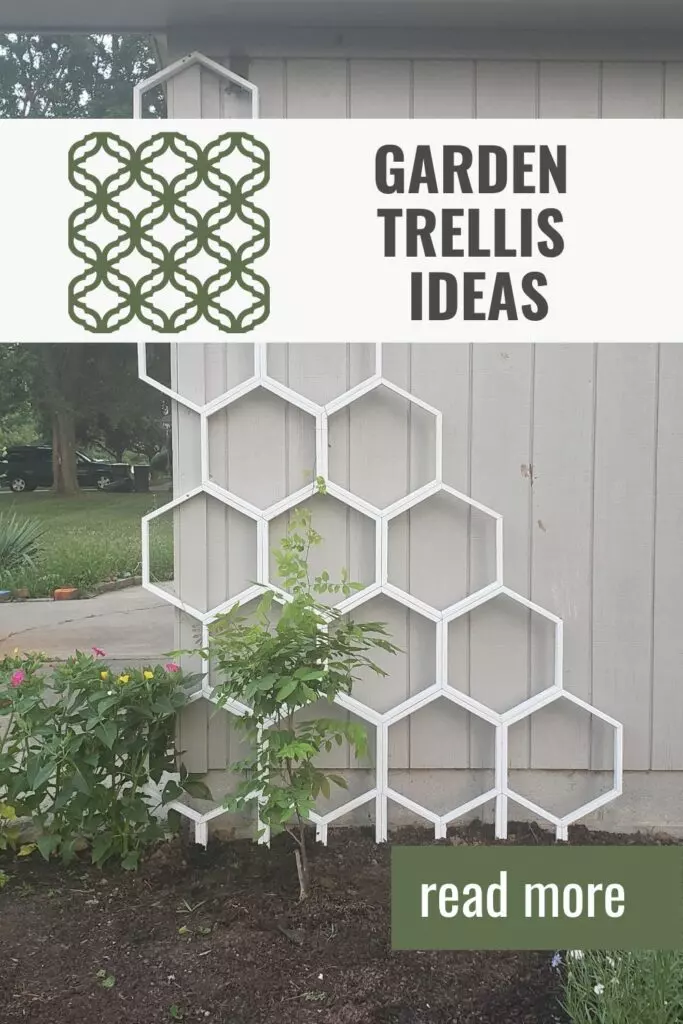Garden trellises are a simple yet effective way to enhance the beauty and functionality of any outdoor space. Trellises provide physical support for climbing plants while also serving as striking vertical design elements. With so many types and styles to choose from, you can easily incorporate trellises of any size and style in your front garden and backyard. This guide covers the key benefits of garden trellises, the most popular types, placement tips, and design recommendations to help you add beautiful trellised features to your own outdoor oasis. Explore inspiring garden trellis ideas to enhance the charm and functionality of your green space.
Table of Contents
Benefits of Using a Garden Trellis
Garden trellises offer a variety of advantages that make them a versatile and valuable addition to any outdoor space. From maximizing planting area to providing decorative flair, trellises serve many roles beyond just physically supporting climbing plants. Some of the top reasons to incorporate trellises into your landscape design include saving space, assisting climbing plants, creating privacy screens, and adding striking architectural details. Discover why gardeners and landscapers unanimously agree that trellises are about much more than just upholding vines and flowering climbers.
Save Space
One of the best reasons to use trellises in your garden is to maximize limited yard space. Vertical growing allows you to fit more plants into a compact area compared to sprawling vines and bushes. This helps make the most of small gardens. Furthermore, certain vegetables thrive exceptionally well when grown on trellises. For instance, tomatoes, cucumbers, and peas are ideal candidates for vertical gardening.
Recommended reading: What Vegetables Grow on A Trellis – Climbing Vegetables
Provide Support for Climbing Plants
Many famous flowering vines and plants, like clematis, grapes, jasmine, and even some types of roses, need a sturdy structure to climb up and grow properly. Trellises provide this necessary support in an aesthetically pleasing way. Expanding the utility of trellises, they prove beneficial not only for ornamental plants but also for certain vegetables. Vegetables like beans, cucumbers, and peas naturally exhibit climbing tendencies, making them excellent candidates for trellis cultivation. When grown vertically on trellises, these vegetables enjoy improved air circulation, receive ample sunlight, and are shielded from potential ground pests. Continue reading to learn all about garden trellis ideas and unlock the secrets to transforming your outdoor space.
Recommended reading: Planting Zucchini on a Trellis – Growing Zucchini Vertically and Save Space
Create Privacy
Strategically placed trellises covered with dense foliage can create secluded, private spaces within your garden. They make attractive screens to block views or unwanted sights.
Add Architectural Interest
The vertical lines, texture, and height of a trellis stand out against lawns, flowerbeds, and shorter shrubbery. Trellises with ornate patterns or materials like wrought iron create visual interest even when bare.
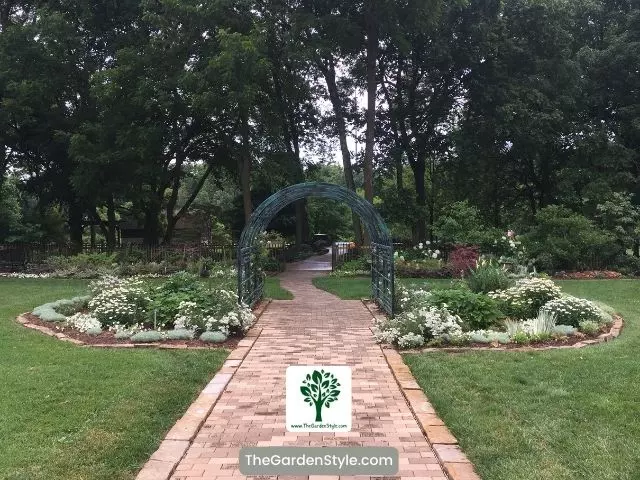
Different Types of Garden Trellises
There are numerous trellis designs to match any garden. Consider both form and function when selecting the right style.
Fan Trellis
This trellis features diagonally crisscrossing slats in an attractive fan pattern named for its distinctive fan shape. The slats radiate outward from a central point, providing abundant vertical support across a wide horizontal span. This makes fan trellises an excellent choice for covering large flat surfaces such as fences, brick walls, or sections of exterior walls. The angled slats provide even support and stability across the trellis’ entire width and height. This allows climbing plants to neatly spread out as they grow upward, creating a lush vertical garden on whatever surface the fan trellis adorns. The eye-catching fan shape also adds a unique visual element to gardens.
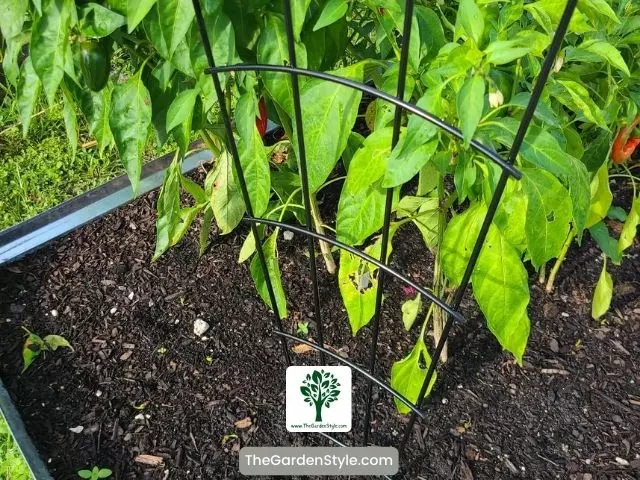
Arch Trellis
An arch makes for an iconic garden trellis. The graceful curved top and sides are pleasing to the eye while providing stability for climbing plants. Arbors create charming walkways to welcome visitors, and stand-alone arches make excellent supports for entryways or doorway accents. The upward-sloping shape also effortlessly draws the eye, making arches ideal focal points. Position arch trellises anywhere you want to add a touch of classic elegance.
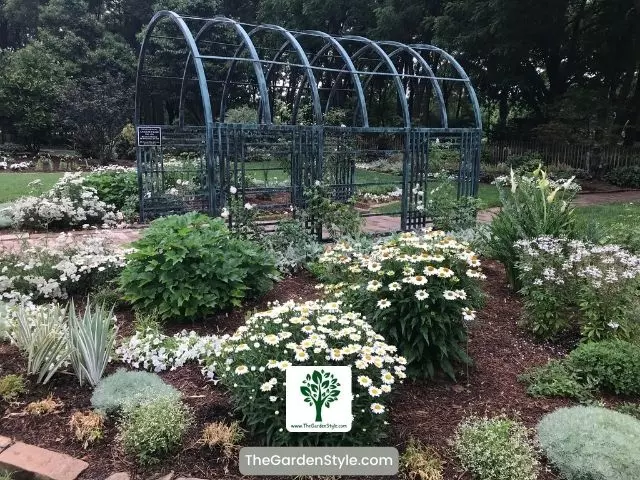
Obelisk Trellis
Obelisk trellises have a striking vertical form that rises skyward like a slender spire, making them an excellent addition to your garden trellis ideas. Their tall, narrow profile is perfect for training a single climbing vine or plant straight upwards. Use obelisks as eye-catching stand-alone features amid flowerbeds or along walkways. Their height makes them visible from a distance, and they occupy minimal ground space. Obelisks work well in geometric formal gardens where their vertical lines mirror surrounding architecture and patterns.
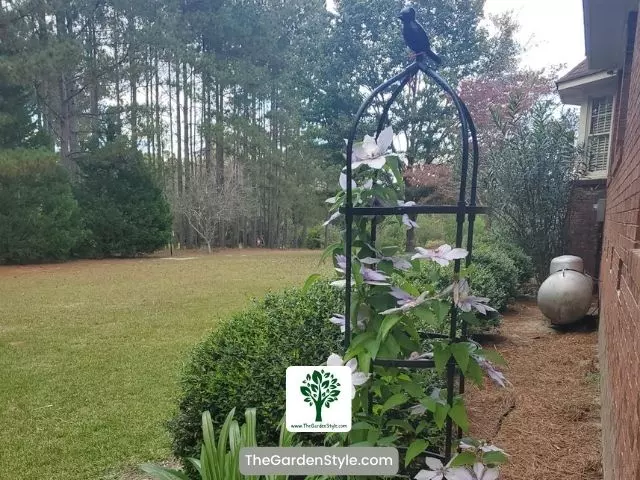
Fence Trellis
Trellised fence panels maximize underutilized vertical space by transforming drab perimeter fencing into beautiful walls of greenery. Fence trellises feature horizontal bars at various heights attached to existing fences. This allows plants to securely climb up, adding privacy and beauty to fenced yard boundaries. Multilevel trellis fencing utilizes vertical space efficiently, greening up gardens without taking up more square footage.
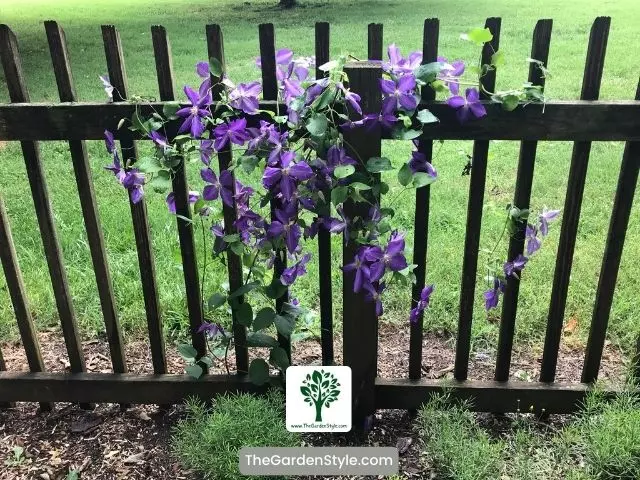
Wall Trellis
Wall trellises transform solid exterior walls into vertical growing spaces, offering versatile garden trellis ideas. By training climbing plants against a flat surface, a simple wooden trellis not only beautifies but also maximizes space productively. Ideal for small yards, this space-saving technique allows tiny gardens to support more plants on existing vertical structures. Moreover, wall trellises conveniently cover unattractive walls and buildings with lush foliage, vines, and vibrant flowers, turning ordinary spaces into visually appealing, green features. Explore the possibilities of incorporating wall trellises into your garden trellis ideas to enhance both aesthetics and functionality in your outdoor haven.
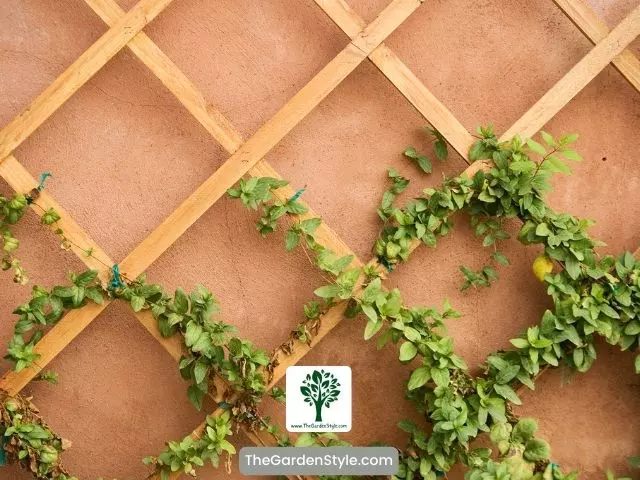
Honeycomb Trellis
Honeycomb trellises live up to their name with their distinct beehive-like appearance. This grid pattern features hexagonal openings that offer maximal support and flexibility for winding climbing plants. The interconnected hexagons provide support from multiple angles and allow plants to weave intricately through the gaps. Honeycomb trellises are perfect for training delicate vines and creating intriguing multi-dimensional displays. Their organic, web-like look adds visual interest to gardens when viewed up close.
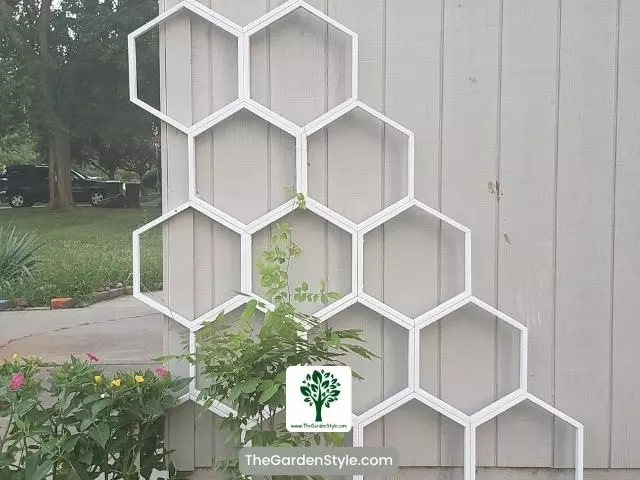
Plastic Netting Trellis
An extremely affordable and customizable option, plastic netting makes a lightweight and versatile garden trellis material. The woven plastic mesh comes in rolled panels that can be cut to any size. Flexible netting conforms easily to curved or irregular shapes. The unobtrusive grid fades into the background, putting the lush greenery of climbing plants center stage. Plastic net trellises are ideal temporary structures since they are easy to install each season and take down later.
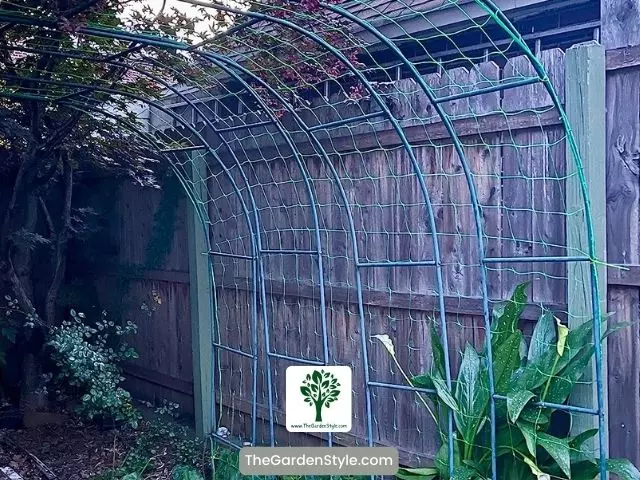
Bamboo Trellis
For gardeners seeking a natural material, bamboo trellises made with bundled bamboo poles make rugged and sustainable trellises. Bamboo’s strength and straight vertical stalks are ideally shaped for supporting vines and upward growth. Intertwined bamboo rods create airy, organic patterns. Both the trellis and lush green climbers complement each other beautifully. Bamboo trellises introduce an exotic, tropical look while remaining affordable and easy to assemble in the backyard. They are low maintenance and gracefully weather even the rainiest climates.
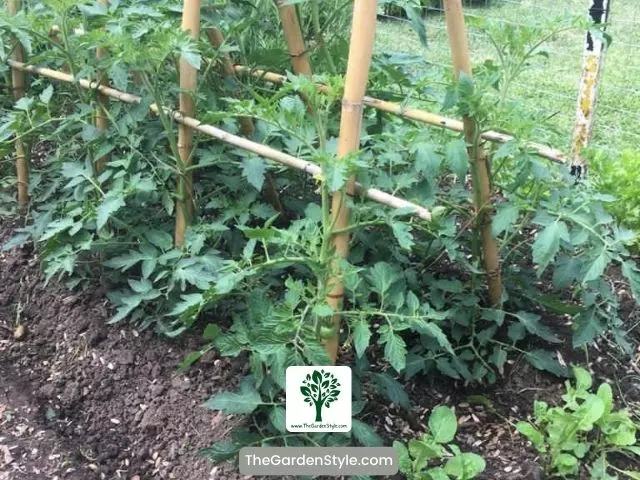
Cattle Panel Trellis
Cattle panels are the cheapest solution for an instant and strong trellis. These large metal grids are actually intended for penning livestock but serve double duty as the bones of robust garden trellises. Cattle panels come in standard sizes with spaced wiring, perfect for letting climbing plants ascend. Their heavy-duty welded steel construction withstands all weather and the heaviest fruit loads. For frugal gardeners or anyone needing an instant trellis, cattle panels are a handy solution.
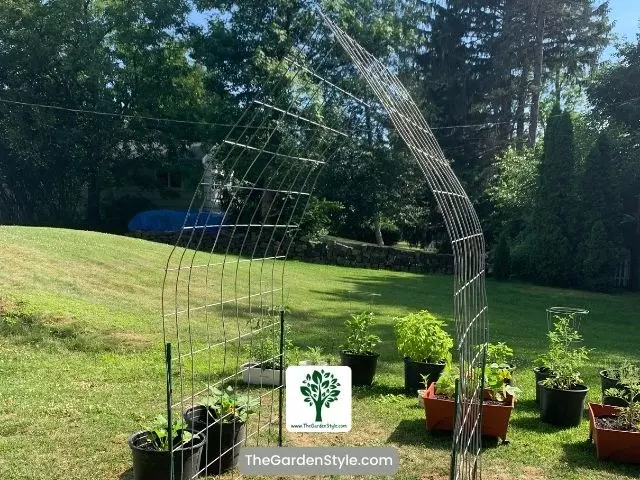
Choosing the Right Location
The ideal spot for your trellis depends on several factors:
Sunlight: Pay attention to how much sun or shade an area receives when placing your trellis. Match it with plants that thrive in those light conditions.
Soil: Plant your trellis in a spot with fertile, well-draining soil suited for the plants you want to grow on it. Amend poor-quality soil if needed.
Accessibility: Make sure to position your trellis somewhere you can easily access and maintain it. Leave room to prune vines, pick fruit, and make repairs.
DIY vs. Prefabricated Garden Trellises
Deciding between a homemade or store-bought trellis often comes down to:
Cost: Prefab trellises are inexpensive, but DIY versions made with scrap wood or low-cost materials can be even cheaper.
Customization: The DIY approach lets you create a one-of-a-kind trellis perfect for your space, while pre-made ones come in standard sizes.
Time and Effort: Simple DIY trellises are beginner-friendly, but more complex designs require advanced woodworking skills and tools.
Spruce up your garden with a custom DIY trellis! This fun, easy video tutorial shows how to build a stylish trellis that adds personality to your outdoor space. With just a few simple materials, you’ll be able to craft a unique garden focal point in no time. Let’s get inspired and start creating your own personalized garden trellis today!
Design Tips
Follow these guidelines to enhance your garden’s design with beautiful trellises:
Match the Trellis to Your Garden Style
Choose trellis shapes and materials that complement your garden’s existing features and architecture. Formal gardens suit symmetrical, ornate trellises, while rustic materials like twigs work for cottage gardens.
Consider Height and Proportions
Visually balance the trellis height and width with surrounding plants and garden elements. Overly tall, skinny trellises can loom disproportionately.
Use Durable Materials
Select weather-resistant woods, metal, or plastic to stand up to the elements. Softer woods like cedar and redwood last longer than pine.
Incorporate Other Decor
Enhance plain trellises by adding decorative touches like finials, vines, flowerboxes, or solar lights. This creates visual interest when plants aren’t in bloom.
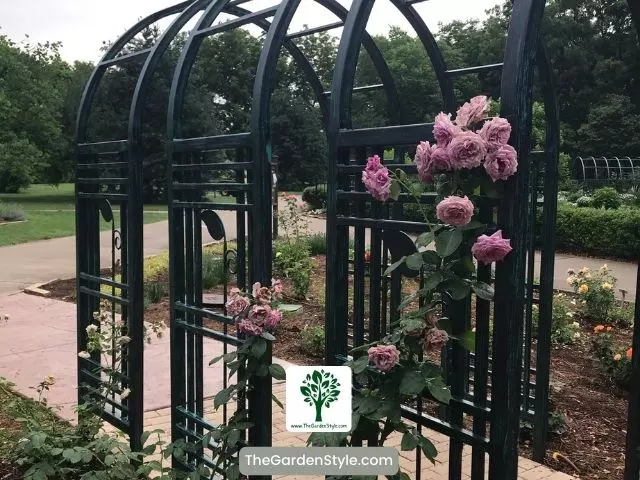
Conclusion
With their vertical growing space and innate beauty, it’s easy to see why garden trellises are so popular. Add height, privacy, and visual appeal to your own outdoor space with a trellis matched to your needs and style. Pay attention to location, scale, and materials to seamlessly integrate your trellis. With proper care, it will enhance your garden for years to come. Get inspired by these versatile garden structures and discover the joy of growing up!
Frequently Asked Questions
Durable, weather-resistant materials like cedar, redwood, plastic, wrought iron, and aluminum are best for outdoor trellises. Avoid softwoods like pine that deteriorate quickly outside.
Trellis’s height depends on your space, but 5-8 feet suits most gardens. Match the height to the mature size of the climbing plants. Too tall looks disproportionate.
Secure freestanding trellises by concreting the legs 12-18 inches into the ground or using trellis foot anchors. They should remain upright and stable when loaded with plants.
Painting or staining wood trellises adds weather protection and design flair. Use exterior grade, non-toxic paint/stain. Unfinished cedar and redwood develop an attractive silvery patina.
Great options include vines like grapes, clematis, honeysuckle, jasmine, and climbing roses. Bean and pea vegetables also grow well, supported by trellises. Choose plants suited to your climate and trellis location.
If this post about garden trellis ideas was helpful, please share it:
